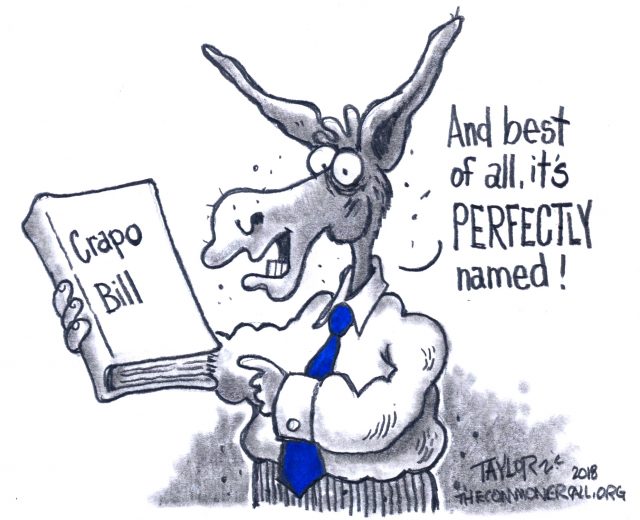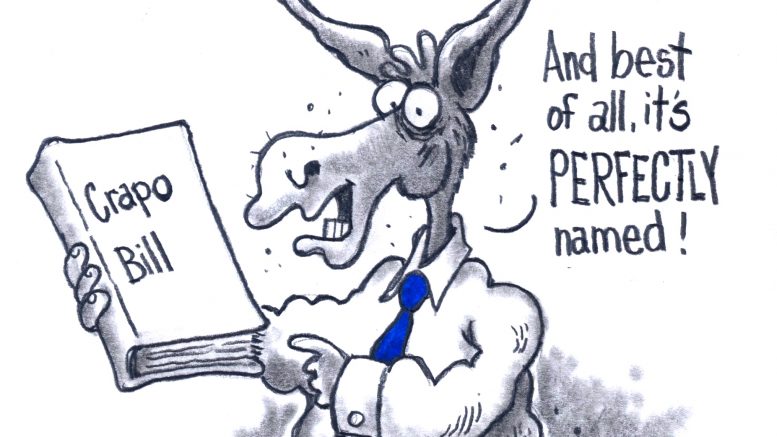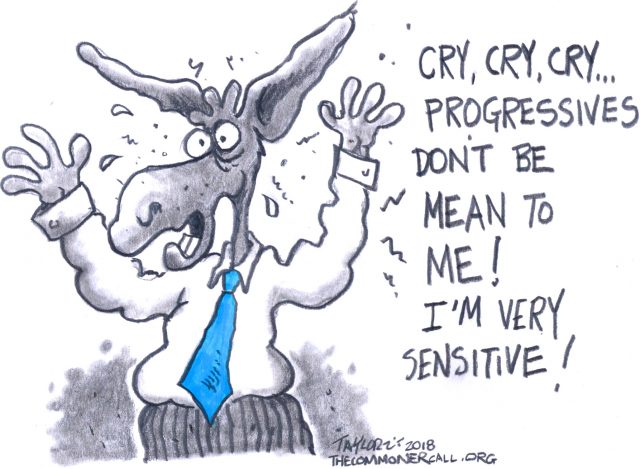
By Marshall Auerback
AlterNet (3/10/18)
As if to maximize the possibility of another major financial crisis, the Trump administration and the GOP have recently been busy undercutting the limited safeguards established a decade ago via Dodd-Frank. The latest example of this stealth attack on Wall Street reform is the Economic Growth, Regulatory Relief, and Consumer Protection Act, appropriately sponsored by Republican Senator Mike Crapo of Idaho, chairman of the Senate Banking Committee. Appropriate, because this is literally a “crapo” bill. It provides a few “technical tweaks” to Dodd-Frank in the same way in which protection payouts to organized crime provide businesses with “insurance” against property damage. In reality, it is an act of regulatory vandalism, which highlights everything that is corrupt about our political system.
An aide for Mark Warner vigorously contested the idea that campaign donations from Wall Street ever influenced the Virginia senator’s decision-making on policy matters. Sure, and it was shocking to find out that gambling took place in Rick’s Café.
We have grown to expect no less from the GOP, whose sole raison d’etre these days seems to be filling the trough from which America’s fat cats can perpetually gorge themselves. What is truly disturbing, however, is that the Republican effort is being given bipartisan cover by more than a dozen Democratic senators: Doug Jones (Ala.), Joe Donnelly (Ind.), Heidi Heitkamp (N.D.), Jon Tester (Mont.), Mark Warner and Tim Kaine (both from Va.), Claire McCaskill (Mo.), Joe Manchin (W.Va.), Gary Peters (Mich.), Michael Bennet (Colo.), Chris Coons (Del.), and Tom Carper of Delaware. To this esteemed group, we should also add Senator Angus King (ME), an Independent who regularly caucuses with the Democrats. So, in reality, it’s a filibuster-proof “Baker’s Dirty Dozen.” Digging into the details, perhaps this is what Senator Mitch McConnell had in mind when he predicted more bipartisanship in Congress this year. In co-sponsoring this bill, the 13 senators are providing cover for the GOP when the inevitable fallout comes, dissipating the Democrats’ political capital with the electorate in the process.
Yes, we get it: some of these senator incumbents are in red states that voted heavily for Donald Trump in the last election. And the latest polls suggest many are vulnerable in this year’s elections. But the last time we checked, there didn’t seem to be an overwhelming wave of populist protest demanding regulatory relief for banks. All 50 states—red and blue—suffered from the last financial crisis, and it’s hard to believe voters in Montana, West Virginia, North Dakota, Indiana or Missouri would be more likely to support Senators Tester, Manchin, Heitkamp, Donnelly or McCaskill because they backed a bank deregulation bill (which in reality goes well beyond helping small community banks). Nor do the 2018 races factor as far as Senators Warner, Coons, or Bennet are concerned, given that none are up for re-election this year.
Bought & paid
No, the more likely answer is money, plain and simple. The numbers aren’t in for 2017, but an analysis of the Federal Election Commission data from the 2016 election appears to explain what is driving this newfound solicitousness toward the banks. The Center for Responsive Politics (CRP) points out that “nine of the twelve Democrats supporting the deregulatory measure count the financial industry as either their biggest or second-biggest donor.” (At least now we have a better understanding as to why Hillary Clinton’s “responsibility gene” induced her to select running mate Tim Kaine, who received “large contributions from Big Law partners that represent Wall Street,” as opposed to a genuine finance reformer, such as Senator Elizabeth Warren. Senator Warren is vigorously opposing the new bill.) …
*****
How Democrats Are Helping Trump Dismantle Dodd-Frank Consumer Reforms
By Talmon Joseph Smith
The New Republic (3/1/18)
As the U.S. approaches the tenth anniversary of the 2008 financial meltdown, it faces a massive test of the post-crisis regulatory apparatus—thanks in no small part to Democrats in Congress.
A deregulatory bill, S.2155, introduced by Republican Senator Mike Crapo of Idaho, chairman of the Senate Banking Committee, proposes a major rollback of the 2010 Dodd-Frank Act. Dubbed The Economic Growth, Regulatory Relief, and Consumer Protection Act, it cruised through the committee in January. Although there are several elements to the bill, the most eye-popping provision is a significant shift in which banks are considered “systemically important” and thus subjected to greater oversight and tighter rules. Currently, banks with $50 billion in assets fall into that category. The proposal would move the threshold to $250 billion—a 500 percent jump that would erase the mandate of enhanced scrutiny for 25 of the 38 largest banks in the country.
Even under the watchful eye of a rising populist wing, Democrats remain close to the financial sector. Commercial banks, in particular, have stepped up campaign contributions to the bill’s supporters ahead of the vote.
The measure’s framework is expected to eventually pass the Senate thanks to a dozen finance-friendly and swing-state Democrats who have openly announced their co-sponsorship. With Republicans in control of the House, the bill seems destined to reach President Donald Trump’s desk this year.
Despite the vocal opposition of more liberal colleagues such as Senators Elizabeth Warren of Massachusetts and Sherrod Brown of Ohio, the bill’s leading Democratic co-sponsors expect it to be debated as soon as next week, according to a senior Senate aide involved in the process. The intra-party debate regarding the regulatory rollback is giving new insight into the battle for the direction and identity of the party ahead of this year’s midterms, hardening a divide between those who would move the party left to energize the base as well as populist independents and those attempting to appease more conservative voters and the party’s deep-pocketed donors.
#bailoutcaucus
Many progressive activists, led by the anti-corruption organization Rootstrikers, have taken to calling the Democratic co-sponsors the #bailoutcaucus. Nine of the twelve Democrats supporting the deregulatory measure count the financial industry as either their biggest or second-biggest donor, according to an analysis of Federal Election Commission data listed by The Center for Responsive Politics. …
*****
Progressives Have Advice For Fragile Little Roll-Over Senate Dems Who Don’t Like Being Criticized By Elizabeth Warren: Just Vote Against The Damn Big Bank Giveaways
By Jake Johnson
Common Dreams (3/9/18)
“If Warren’s colleagues didn’t want to be criticized as Wall Street-owned hacks, then they could choose not to vote for legislation that enriches Wall Street.”
That’s what progressive writer and activist Jonathan Cohn had to say overnight as reports emerged that Democrats are upset at Sen. Elizabeth Warren (D-Mass.) over her criticism of their vote to advance a bill that would reward Wall Street and heighten the risk of another financial crisis.
According to CNN‘s Jake Tapper, Warren “really angered many of her Democratic Senate colleagues” by highlighting the names of the 16 Senate Democrats and one Democratic-leaning independent who voted to propel the “Bank Lobbyist Act” over a crucial procedural hurdle. A final vote on the measure (S.2155) is expected next week.
“Dems who vote to weaken one of the party’s signature (albeit still insufficient) laws to restrain banks deserve every criticism leveled at them.” — Richard Yeselson, Dissent Magazine
In a report published late Thursday, The Hill confirmed this widespread anger among Democrats, who—according to one anonymous aide—find it “disappointing” that Warren would go after members of her own party for backing a bill that analysts say would make it easier for banks to “hide racial discrimination in mortgages,” significantly increase the risk of future taxpayer bailouts, and reward massive Wall Street firms like Citigroup and JPMorgan Chase.
The Democratic aide also accused Warren of opportunistically attacking the deregulatory bill to “raise money for her campaign,” highlighting an email Warren sent to supporters calling on them to circulate an image of the vote tally.
Another anonymous aide quoted by The Hillrepeated the trope—by now thoroughly debunked by the Congressional Budget Office (CBO), journalists, and federal regulators—that the GOP-crafted measure would only provide “relief for community banks and credit unions across rural America.”
Standing up to the heat
Warren hasn’t been shy about acknowledging the blowback that could result from criticizing members of her own party.
“Saying Democrats are helping to roll back rules on big banks doesn’t make me the most popular kid on the team,” Warren wrote in a Medium post on Thursday, adding that she has been “taking heat from fellow Democrats” since she called them out earlier this week. “But Massachusetts didn’t send me here to fight for big banks. The people of Massachusetts sent me here to fight for them.”
Responding to growing anger at Warren for having the gall to highlight vote counts that are in the public record, progressives recommended a simple fix for Democrats: vote against the deregulatory bill.
Even a self-described “loyal” Democrat—Shareblue‘s Matthew Chapman—denouncedthe attacks on Warren, called the deregulatory bill “shit,” and concluded, “if Democrats don’t like being criticized for supporting it, they can vote no.”
(This work is licensed under a Creative Commons Attribution-Share Alike 3.0 License.)
(Commoner Call cartoons by Mark L. taylor, 2018. Open source and free to use with link to www.thecommonercall.org )
*****
PETITION: Tell Sen. Schumer To Save Banking Protections
CREDO (3/10/18)
On Tuesday, 17 Senate Democrats voted to advance legislation that the nonpartisan Congressional Budget Office predicts will raise the chances of future taxpayer-funded bank bailouts.
Sen. Elizabeth Warren has been fighting this bill tooth and nail, even facing heat from her colleagues for criticizing the Democrats trying to roll back rules on big banks. But Senate Democratic Leader Chuck Schumer, in contrast, has been missing in action – letting the Wall Street bailout bill move forward seemingly without lifting a finger to stop it. As Vox reports:
“You wouldn’t see defections on this scale… if leaders really wanted to block it. It’s an abdication of responsibility, and it’s appalling.”
Refusing to lead right now means deliberately letting Wall Street win. There is still time before the final Senate vote, and we need to force Schumer to act.
Tell Chuck Schumer: Stop letting Wall Street win. Click here to sign the petition.


